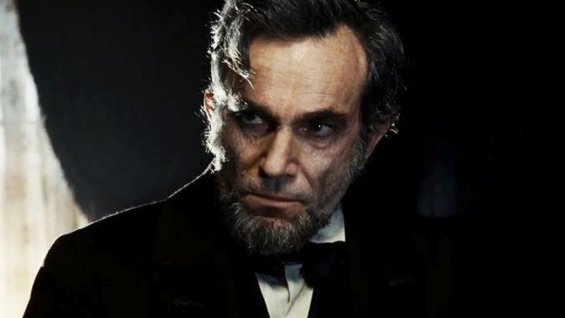Lincoln
There are moments scattered throughout LINCOLN where the principals, namely Abraham Lincoln (Daniel Day Lewis) and his wife Mary Todd (Sally Field), comment upon themselves. They wonder how history will view them. Muse aloud about their public perceptions and if generations next will pidgeonhole them. It must be a great temptation for biographers to do this. Screenwriter Tony Kushner, basing his work largely on Doris Kearns Goodwin's book Team of Rivals: The Political Genius of Abraham Lincoln, has constructed a thorough, dense examination of the President's final months in 1865, as a second term looms with the urgency to end both the Civil War and slavery. Lincoln is shown to have a penchant for telling lengthy stories, sometimes to the chagrin of his colleagues. Within and without them are moments of introspection, of wonder. Of how future Americans and those abroad will observe his decisions. Did Lincoln really utter such thoughts?
It's a bit of a conceit, any time characters from the past comment upon the future. Of course, the authors of their words have the benefit of the present, and a hindsight upon which they shine a light to reveal the outcomes of earlier actions. In LINCOLN, one constituent, when considering matters of not only abolition, but of complete racial equality, a co-existence not possible while Lincoln attempts to get his amendment passed, wonders if suffrage for women could next. Even a character in DAZED AND CONFUSED, philosophizing during a keg party in 1976, wonders aloud of the coming decade, speaking things that suggest she either has great insight/foresight or is working from a script that thoughtfully considers the eventual fallout.
This seems to be a bit of minutiae, a funny tidbit to focus upon when discussing Steven Spielberg's latest film, but it filled my mind throughout this long but completely engrossing film. The director did not bathe his movie in some sort of sentimental gauze, nor did he cast the President in any angelic light, but rather the wistfulness of knowing the future makes the events of LINCOLN so much more poignant. This is a rare contemporary film that manages to be true to its subject and matters at hand, while still allowing emotional honestly that naturally derives from both familial and political drama.
LINCOLN is an impressive achievement for Spielberg in ways that echo his most spare tendencies, seen in SCHINDLER'S LIST and parts of EMPIRE OF THE SUN and MUNICH. When I watched the trailer a few months earlier, my heart sank. It appeared that LINCOLN would be an overly fashioned costume drama filled with familiar actors in funny hairpieces. Fetishistic attention to period detail but little substance. Actors chewing the scenery. John Williams' majestic score cuing every reaction. Big, loud spectacles to match the music. Heavy syrup.
Within minutes, those fears were dispelled. Spielberg and crew have taken the most tastefully minimalist approach. The opening scene does feature some flashes of brutal warfare, but nothing like the prolonged carnage of SAVING PRIVATE RYAN. In fact, after a few such edits, the film announces its spare stylings with the President conversing with a few soldiers, one of whom recounts his Gettysburg Address. The scene feels almost spontaneous, not so orchestrated. The remainder of the film is a sober, supremely confident examination of a patient leader burdened with a heavy heart and blessed with a quiet, frequently misinterpreted savvy. A recognizance of how to engineer the end of slavery and the rule of Confederacy in one Amendment (the 13th, passed in December of 1865). LINCOLN moves almost imperceptibly from one observant moment to the next, but never once feeling "produced" or with some faux sense of importance, though every moment is just that. The score is spare and the art direction is letter perfect without calling attention to itself.
I mention that Lincoln, played with absolute authority and restraint by Lewis in a performance that can't be lauded enough, is not portrayed as a one-dimensionally self-serious dullard. Nor as a flawless saint. Or even Larger than Life. He is often seen hunched, immersed in thought. But he is also not portrayed as a passive or pious figure. The complexities along the road to Amendment passage in the House are numerous, with much backroom wheeling and dealing, vote courting, and even some creativity with the English language (Lincoln was a lawyer, after all). Watching the mechanics of politics in LINCOLN never becomes tiresome or boring, but reminds us 1. Compelling filmic drama often occurs merely when people are speaking to each other and 2. Little has changed in Washington. 3. For a great(er) cause, sometimes the path there may be fraught with a bit of eyebrow raising tactics. Sometimes, the end truly justifies the means.
Lewis is surrounded by a superb cast, all of whom are quite fine. Field draws much strength as a mother concerned about her eldest son Robert (Joseph Gordon-Levitt), who is itching to fight in the War. She has long grieved another son who had passed away and in an especially powerful scene confronts her husband over his perceived lack of grief. Tommy Lee Jones plays Thaddeus Stevens, Congressional leader of the Radical Republicans, whose single-mindedness for abolition fires his mission (and his tongue); this performance is almost certain to garner an Academy Award nomination. James Spader also gets to flex some acting chops as Party operative William Bilbo, one of several Lincoln enlists to solicit votes from reluctant House Democrats. David Strathairn, Jackie Earl Haley, Tim Blake Nelson, and many others are all solid.
By the end, when Lincoln sits on a porch with Ulysses S. Grant (Jared Harris), the latter remarks how it appears that the President had aged a decade since he last saw him. Yes, little has changed in Washington.



Comments